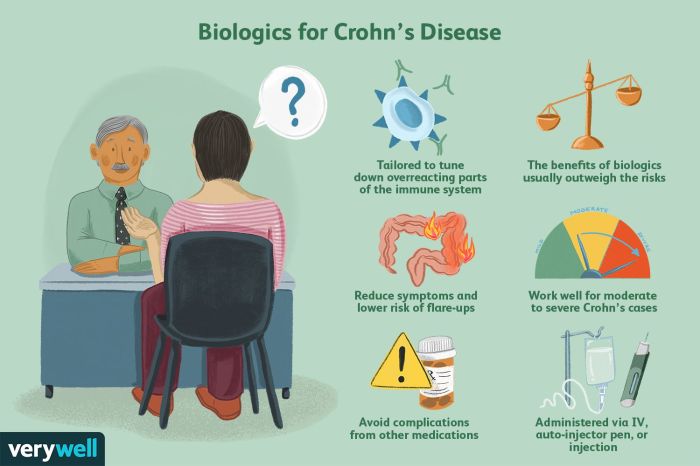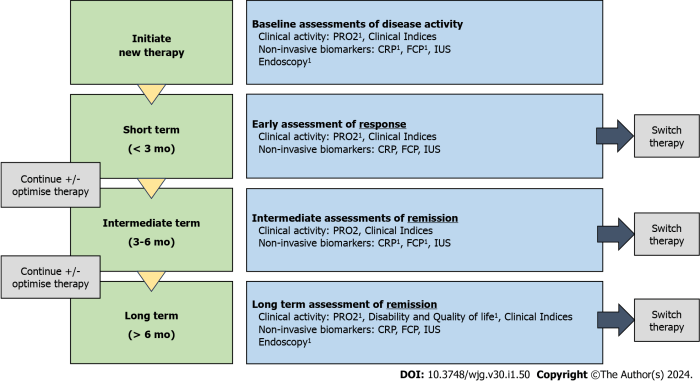Exploring the realm of Best Modern Therapies for Crohn’s Disease in 2025 opens up a world of possibilities and advancements in medical science. As we delve into the latest treatments and breakthroughs, we uncover a landscape filled with hope and promise for those battling this chronic condition.
Overview of Crohn’s Disease

Crohn’s Disease is a chronic inflammatory condition that primarily affects the digestive tract, causing inflammation in any part from the mouth to the anus. This autoimmune disorder can lead to a range of symptoms and complications, significantly impacting the quality of life for those diagnosed with the disease.
Common Symptoms and Challenges
- Abdominal pain and cramping
- Diarrhea
- Fatigue
- Weight loss
- Loss of appetite
Living with Crohn’s Disease can be challenging as it often involves managing these symptoms on a daily basis, which can affect a person’s ability to work, socialize, and engage in regular activities.
Importance of Effective Treatments
Finding effective treatments for Crohn’s Disease is crucial in helping patients manage their symptoms, reduce inflammation, and prevent complications. With the right treatment plan, individuals with Crohn’s Disease can experience improved quality of life and better disease management, allowing them to lead more fulfilling and active lives.
Current Treatment Landscape for Crohn’s Disease
Crohn's Disease is a chronic condition that requires long-term management to control symptoms and prevent complications. The treatment landscape for Crohn's Disease includes various traditional therapies that aim to reduce inflammation in the digestive tract and alleviate symptoms.
Overview of Traditional Therapies
- Immunosuppressants: Drugs that suppress the immune system to reduce inflammation.
- Steroids: Anti-inflammatory medications used to reduce swelling and pain during flare-ups.
- Biologics: Targeted therapies that block specific proteins involved in the inflammatory response.
Limitations and Side Effects
- Immunosuppressants can increase the risk of infections due to a weakened immune system.
- Steroids may cause weight gain, mood changes, and osteoporosis with long-term use.
- Biologics can lead to allergic reactions and are associated with a higher risk of certain infections.
Comparing Efficacy of Different Treatment Options
- Biologics have shown to be more effective in inducing and maintaining remission compared to other traditional therapies.
- Immunosuppressants are often used as maintenance therapy to prevent relapses.
- Steroids are typically used for short-term symptom relief but are not recommended for long-term use due to side effects.
Emerging Therapies for Crohn’s Disease
Crohn's Disease is a complex condition that requires continuous advancements in medical research to improve treatment outcomes. In recent years, several promising therapies have emerged, offering new hope for patients dealing with this chronic inflammatory disorder.
Targeted Biologics
Biologic therapies have revolutionized the treatment of Crohn's Disease by targeting specific proteins in the immune system that contribute to inflammation. These targeted biologics work by blocking molecules such as tumor necrosis factor-alpha (TNF-alpha) or interleukins, reducing inflammation and alleviating symptoms.
Drugs like ustekinumab and vedolizumab have shown significant efficacy in clinical trials, providing a more personalized approach to managing Crohn's Disease.
Stem Cell Therapy
Stem cell therapy is another emerging treatment option for Crohn's Disease, offering the potential to repair damaged tissues and regulate the immune response. By harnessing the regenerative properties of stem cells, researchers aim to modulate the inflammatory process in the gut, promoting healing and reducing symptoms.
While still in the early stages of development, stem cell therapy holds promise for patients with refractory Crohn's Disease who have not responded to conventional treatments.
Microbiome Modulation
The gut microbiome plays a crucial role in the pathogenesis of Crohn's Disease, with dysbiosis (imbalance of gut bacteria) contributing to chronic inflammation. Emerging therapies focused on microbiome modulation aim to restore a healthy balance of gut bacteria, thereby reducing inflammation and improving disease outcomes.
Approaches such as fecal microbiota transplantation (FMT) and probiotics are being investigated as potential strategies to rebalance the gut microbiota and alleviate symptoms in Crohn's Disease patients.
Gene Therapy
Gene therapy is a cutting-edge approach that holds promise for treating Crohn's Disease at the genetic level. By targeting specific genes involved in the inflammatory response, researchers aim to modify immune cells to reduce inflammation and restore intestinal function. While still in the experimental phase, gene therapy offers a potential long-term solution for managing Crohn's Disease by addressing the underlying genetic factors contributing to the condition.
Best Modern Therapies for Crohn’s Disease in 2025
Crohn's Disease is a chronic inflammatory condition of the gastrointestinal tract that can be challenging to manage. As we look towards 2025, several cutting-edge therapies are on the horizon, offering new hope for patients with this condition.
Potential Impact of Cutting-Edge Therapies
In 2025, the introduction of advanced biologics and targeted therapies is expected to revolutionize the treatment landscape for Crohn's Disease. These modern treatments aim to provide more precise and effective management of the disease, leading to improved outcomes and quality of life for patients.
- Biologics: These therapies target specific molecules involved in the inflammatory process, such as tumor necrosis factor (TNF) or interleukins. By blocking these pathways, biologics help reduce inflammation in the gut, leading to symptom relief and disease remission.
- Targeted Therapies: Novel treatments that focus on specific pathways implicated in Crohn's Disease pathogenesis, offering a more tailored approach to treatment. These therapies have the potential to address underlying causes of inflammation, leading to better disease control.
Mechanisms of Action of Modern Treatments
Modern therapies for Crohn's Disease work by targeting key components of the immune response that drive intestinal inflammation. By modulating these pathways, these treatments help restore immune balance and reduce the inflammatory burden in the gut, ultimately alleviating symptoms and preventing disease progression.
- Anti-inflammatory Effects: Many modern therapies act by suppressing pro-inflammatory cytokines or immune cells that contribute to gut inflammation, helping to dampen the overall immune response and reduce tissue damage.
- Tissue Repair: Some treatments promote tissue healing and regeneration in the gut mucosa, aiding in the restoration of normal intestinal function and barrier integrity.
Effectiveness and Safety Profiles
When comparing different modern therapies for Crohn's Disease, factors such as effectiveness, safety, and tolerability play a crucial role in treatment selection. While each therapy has its unique profile, ongoing research aims to identify the most optimal approach for individual patients based on their disease characteristics and treatment goals.
- Effectiveness: Modern therapies have shown promising results in inducing and maintaining remission in Crohn's Disease, with some patients achieving long-term disease control and symptom relief.
- Safety: While these treatments are generally well-tolerated, some may carry risks of adverse effects, such as infections or infusion reactions. Close monitoring and communication with healthcare providers are essential to ensure the safety of treatment.
End of Discussion

In conclusion, the future of treating Crohn’s Disease looks bright with the Best Modern Therapies in 2025 offering innovative solutions and improved outcomes for patients. By staying abreast of these advancements, we can look forward to a future where managing this disease becomes more effective and manageable.
Answers to Common Questions
What are some key symptoms of Crohn’s Disease?
Common symptoms include abdominal pain, diarrhea, weight loss, and fatigue.
How do emerging therapies aim to improve patient outcomes?
Emerging therapies focus on targeting specific pathways to reduce inflammation and improve symptom management.
What sets modern therapies for Crohn’s Disease in 2025 apart from traditional treatments?
Modern therapies in 2025 are designed to be more targeted, effective, and with fewer side effects compared to traditional treatments.









